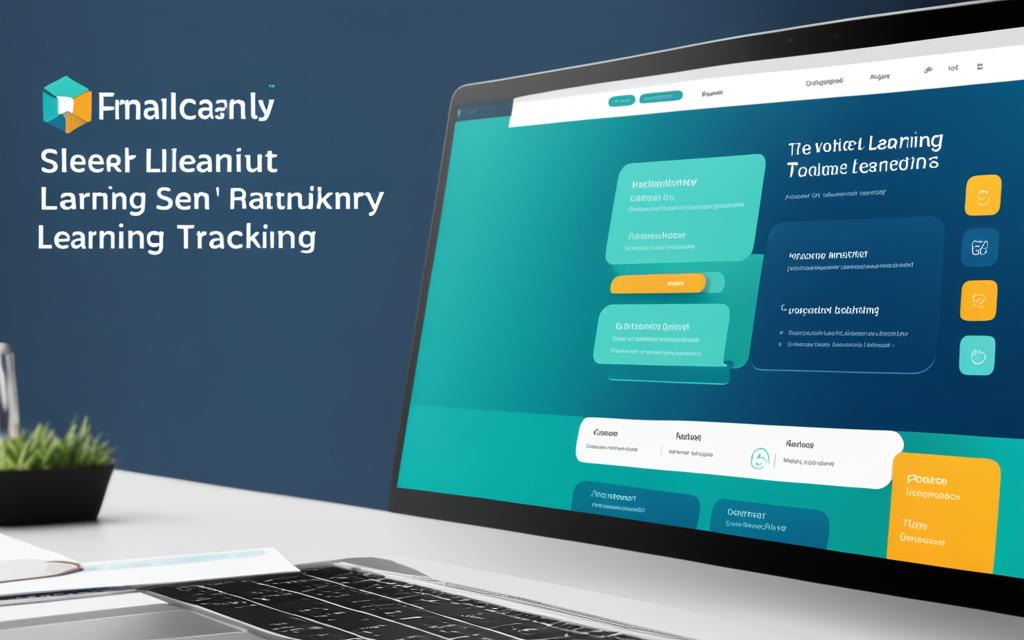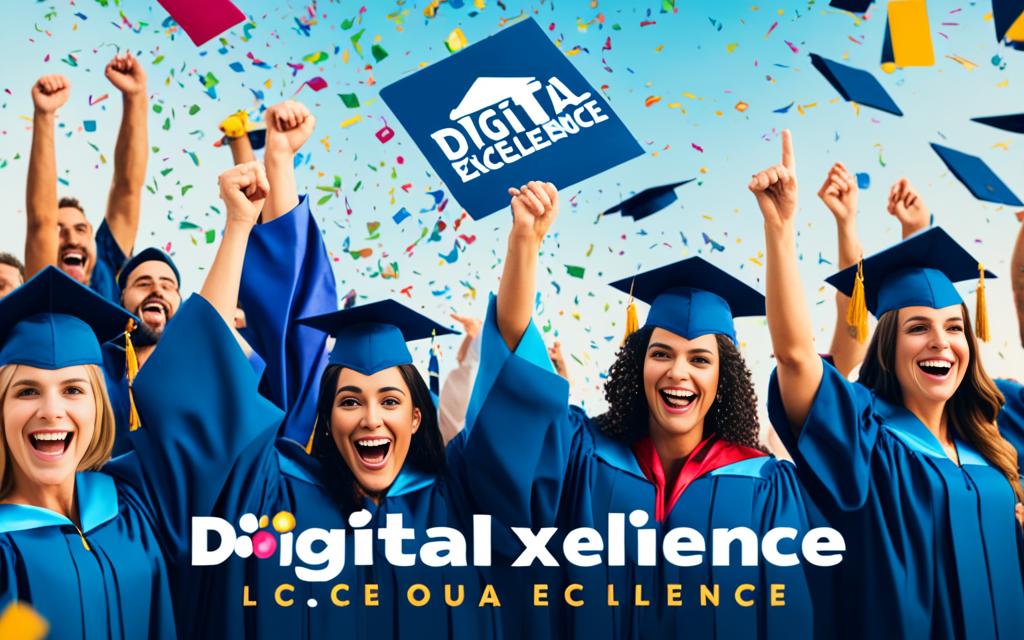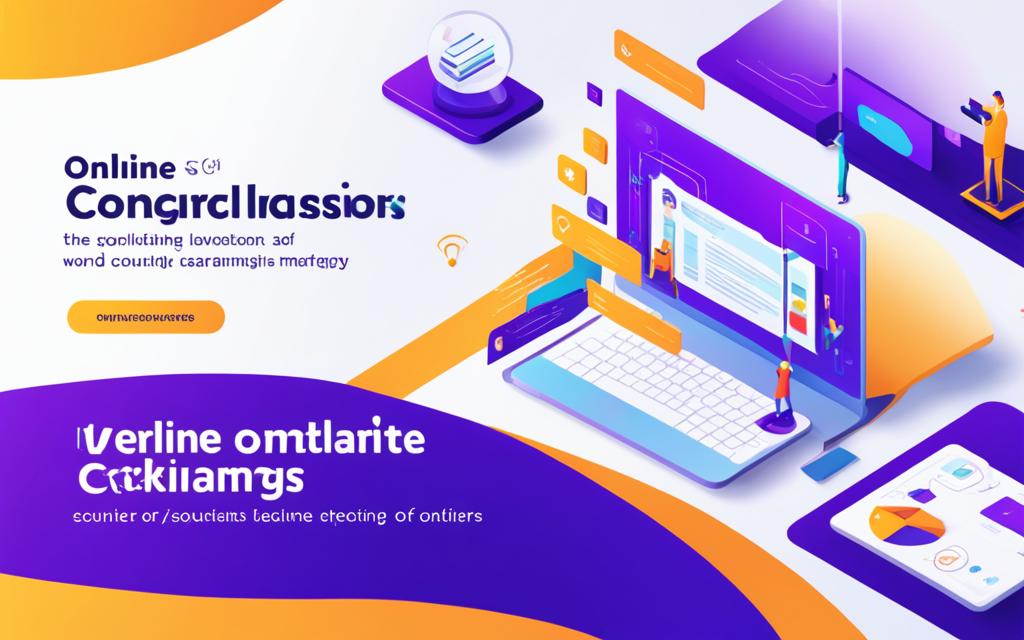In the digital age, education has transcended the confines of traditional classrooms and entered a realm of limitless possibilities. Digital scholarship, combined with the advent of online learning platforms, has paved the way for a luxurious online education experience like never before.
Online learning platforms have evolved to offer a level of sophistication and excellence that rivals even the most prestigious educational institutions. These platforms provide learners with a plethora of opportunities to acquire knowledge, gain skills, and enhance their professional development, all from the comfort of their own homes.
So, what sets these luxurious online learning platforms apart? It’s the marriage of cutting-edge technology, comprehensive course offerings, and a commitment to delivering an exceptional educational experience. With features such as interactive multimedia content, immersive simulations, and personalized learning paths, these platforms redefine the possibilities of online education.
Key Takeaways:
- Digital scholarship, combined with online learning platforms, offers a luxurious online education experience.
- These platforms provide cutting-edge technology, comprehensive courses, and personalized learning paths.
- Online learning platforms redefine the possibilities of online education by leveraging interactive multimedia content and immersive simulations.
The Evolution of Quality Online Education
In recent years, online education has experienced a remarkable evolution, providing learners with quality educational opportunities that rival traditional classroom settings. This evolution has been driven by advancements in technology, pedagogy, and instructional design, resulting in a more engaging and effective online learning experience.
Technological advancements have played a significant role in shaping the evolution of online education. With the development of robust learning management systems, learners now have access to a wide range of interactive tools and resources that enhance their learning experience. From virtual classrooms to collaborative online platforms, technology has created innovative ways to engage students and facilitate knowledge acquisition.
Pedagogy in online education has also seen dramatic improvements. Educators have embraced learner-centered approaches that prioritize active learning, problem-solving, and critical thinking. This shift has resulted in the development of well-structured and engaging online courses that foster deep understanding and application of knowledge.
Furthermore, instructional design has played a vital role in the evolution of online education. Designers now focus on creating intuitive user interfaces, seamless navigation, and accessible content to ensure learners can easily navigate and engage with the course materials. Attention is also given to data-driven assessment and feedback systems, allowing instructors to gauge student progress accurately and provide personalized guidance.
The evolution of quality online education has opened doors for learners around the world, irrespective of their geographical location or personal circumstances. It has made education more accessible, flexible, and inclusive, catering to the diverse needs and interests of learners. Whether it’s pursuing higher education, acquiring new skills, or advancing professional development, online education offers a wealth of opportunities for those seeking quality learning experiences.
\”Online education has come a long way in terms of quality and accessibility. It has revolutionized the way we learn by leveraging technology and innovative teaching methods,\” says Dr. Catherine Miller, an expert in online education and instructional design.
In the next section, we will explore the key components that define a top-tier online learning platform, ensuring learners receive the highest quality education in a digital environment.
Key Components of a Top-Tier Online Learning Platform
In order to provide a high-quality educational experience, a top-tier online learning platform must have several key components. These components ensure that learners have access to a seamless and enriching learning environment that prepares them for success in the digital economy. Let’s explore three essential elements of such a platform: an intuitive user interface, robust course selection, and relevance in the digital economy.
Intuitive User Interface
An intuitive user interface is crucial for online learning platforms as it enhances the overall learning experience. A well-designed interface makes it easy for learners to navigate through the platform, access course materials, and engage with learning resources. Intuitive features such as clear navigation menus, responsive design, and user-friendly interfaces contribute to a seamless learning journey.

Robust Course Selection
A top-tier online learning platform should offer a wide variety of courses across diverse subject areas. This robust course selection ensures that learners can find the courses that align with their interests and career goals. From technical skills to business management, the course catalog should cater to the needs of learners from various backgrounds and professions.
Relevance in the Digital Economy
As the digital economy continues to evolve, it’s crucial for online learning platforms to provide courses and programs that are relevant to the changing job market. By offering courses focused on emerging technologies, digital skills, and industry-specific knowledge, these platforms equip learners with the necessary skills to thrive in the digital economy. They bridge the gap between traditional education and the skills demanded by employers in today’s technology-driven world.
In summary, a top-tier online learning platform should prioritize an intuitive user interface, a robust course selection, and relevance in the digital economy. These components ensure that learners have access to a seamless and enriching educational experience, equipping them with the skills and knowledge needed to succeed in an increasingly digital world.
Understanding Digital Scholarship: Principles and Practices
In the realm of academia, traditional scholarship has long been the cornerstone of knowledge creation and dissemination. However, with the advent of digital technologies, a new form of scholarship has emerged – digital scholarship. In this section, we will delve into the principles and practices that underpin this innovative approach to research and explore how it differs from its traditional counterpart.
Digital scholarship encompasses a wide range of scholarly activities that leverage digital tools and methods to analyze, interpret, and present research findings. It goes beyond the traditional boundaries of pen-and-paper-based scholarship by embracing the vast potential of digital technologies.
The principles of digital scholarship are rooted in openness, collaboration, and accessibility. Unlike traditional scholarship, which often involves restricted access to scholarly work, digital scholarship promotes the free exchange of information and encourages global participation.
Practices of digital scholarship entail the application of digital tools and methodologies to carry out research and share knowledge. These practices include data mining, data visualization, computational analysis, and online publishing. Digital scholars also engage in interdisciplinary collaborations, leveraging the collective expertise of diverse academic disciplines.
One of the key advantages of digital scholarship is its ability to facilitate data-driven research and analysis. With the vast amounts of data available today, digital scholars can harness the power of computational tools and algorithms to uncover patterns, trends, and insights that would be impossible to detect using traditional research methods alone.
By embracing digital scholarship, researchers can explore new avenues of inquiry, uncover hidden connections, and contribute to the ever-expanding knowledge base of their respective fields.
Furthermore, digital scholarship promotes a more inclusive and diverse academic community. It provides opportunities for scholars from different backgrounds and geographical locations to collaborate, share resources, and contribute to the collective body of knowledge. This democratization of scholarship helps break down barriers and creates a more equitable scholarly landscape.
In conclusion, digital scholarship is revolutionizing the way we conduct research and disseminate knowledge. By embracing the principles and practices of digital scholarship, researchers can leverage the power of digital technologies to advance their disciplines and make a meaningful impact in the digital age.
Accredited Online Programs: A Gateway to Digital Excellence
When it comes to pursuing education and acquiring new skills in the digital age, accredited online programs have emerged as a powerful gateway to digital excellence. These programs offer the opportunity to obtain accredited certifications and credentials that hold significant value in today’s competitive job market.

By enrolling in accredited online programs, individuals gain access to a wide range of courses and educational resources that are designed to meet the evolving demands of the digital landscape. Whether it’s acquiring technical skills in fields like programming and data analysis or developing strategic thinking and leadership abilities, online programs provide a flexible and convenient option for learners of all backgrounds.
One of the key advantages of accredited online programs is the ability to obtain industry-recognized certifications and credentials. These certifications validate the skills and knowledge gained through online learning, providing individuals with a tangible proof of their digital expertise. Employers today value these certifications as a testament to an individual’s commitment to continuous learning and digital proficiency, making them highly valuable in enhancing career prospects.
Moreover, accredited online programs offer the opportunity for learners to engage with industry experts and professionals from around the world. Through interactive online platforms, learners can connect with peers, collaborate on projects, and participate in discussions, fostering a sense of community and expanding their professional networks.
With the increasing demand for digital skills and the rapid advancements in technology, online certifications have become essential in staying competitive and relevant in the job market. Accredited online programs pave the way for individuals to acquire the knowledge and skills necessary to thrive in the digital economy, positioning them for digital excellence.
By choosing accredited online programs, individuals can embark on a transformative learning journey that combines flexibility, convenience, and the credibility of accredited education. These programs provide a foundation for digital excellence and offer opportunities for professional growth in the ever-evolving digital landscape.
Virtual Classrooms and Interactive Learning: Beyond Traditional Boundaries
In today’s digital age, virtual classrooms and interactive learning have revolutionized the way education is delivered. These innovative approaches to learning go beyond traditional boundaries, offering a host of benefits that enhance the overall educational experience. Real-time interaction and networking opportunities enable students to connect with peers and instructors, fostering collaboration and meaningful engagement. Additionally, customizable learning environments cater to individual learning preferences, ensuring a personalized and effective learning journey.
Real-Time Interaction and Networking
One of the key advantages of virtual classrooms is the ability to facilitate real-time interaction and networking. Through live chat features, video conferencing, and discussion forums, students can engage in dynamic conversations with their peers and instructors. This real-time interaction promotes active learning, encourages the exchange of ideas, and fosters a sense of community among learners. Moreover, networking opportunities within virtual classrooms provide students with the chance to connect with professionals and experts in their field, expanding their professional network and opening doors to potential career opportunities.
Customizable Learning Environments
Virtual classrooms offer customizable learning environments that cater to the unique needs and preferences of individual learners. Students can tailor their learning experience by adjusting settings such as font size, background color, and audio preferences. This customization fosters a comfortable and conducive learning environment, promoting better knowledge retention and engagement. Additionally, the ability to access learning materials and resources at any time and from any location allows learners to adapt their study schedules to fit their personal and professional commitments.
| Benefits of Virtual Classrooms and Interactive Learning | |
|---|---|
| 1 | Promotes real-time interaction and collaboration among students |
| 2 | Provides networking opportunities with professionals and experts |
| 3 | Allows for customizable learning environments to cater to individual preferences |
| 4 | Facilitates access to learning materials and resources anytime, anywhere |
Innovations in E-Learning: Artificial Intelligence and Course Personalization
In the ever-evolving landscape of e-learning, two key innovations have emerged as game-changers – Artificial Intelligence (AI) and course personalization. These innovations have revolutionized the online learning experience, enhancing engagement, effectiveness, and outcomes for learners.
AI technology has transformed the way educational content is delivered and consumed. Through the use of algorithms and machine learning, AI can analyze vast amounts of data to identify patterns and trends, allowing for personalized and adaptive learning experiences. This technology identifies individual learner needs, preferences, and learning styles, enabling the delivery of tailored content and targeted feedback.
Course personalization, on the other hand, focuses on customizing the learning journey for each individual. By leveraging AI technology, online learning platforms can provide learners with personalized recommendations, suggesting courses and learning materials that align with their interests and goals. This level of personalization not only enhances engagement but also increases the relevance and applicability of the learning experience.
With course personalization, learners have the flexibility to choose their own learning paths and progress at their own pace. This learner-centric approach empowers individuals to take ownership of their education and create a personalized learning experience that meets their unique needs.

AI and course personalization have the potential to transform the way we learn and acquire knowledge. This innovative approach to e-learning ensures that education is tailored to the individual, fostering greater engagement, motivation, and ultimately, success in the digital age.
As the demand for flexible and personalized learning increases, the integration of AI and course personalization in e-learning platforms will continue to evolve, providing learners with richer and more immersive educational experiences.
Coursera’s Mission: Democratizing Access to World-Class Learning
In its pursuit to democratize access to world-class learning, Coursera has made significant strides in global expansion, attracting a diverse learner base. With its mission to bridge gaps in higher education infrastructure, Coursera has revolutionized the way individuals access high-quality education.
Global Expansion and Diverse Learner Base
Coursera’s global reach extends to learners in over 190 countries, providing them with unparalleled access to a wide range of courses and programs. By expanding its platform globally, Coursera has broken down geographical barriers, making education accessible to individuals regardless of their location. This global expansion ensures that learners from diverse backgrounds and cultures can benefit from the rich educational content offered on the platform.
Furthermore, Coursera’s commitment to diversity goes beyond geographical boundaries. The platform attracts a diverse learner base, comprising individuals from different age groups, educational backgrounds, and professional experiences. This diversity fosters a vibrant and inclusive learning environment, where learners can engage in meaningful discussions and benefit from different perspectives.
Bridging Gaps in Higher Education Infrastructure
One of Coursera’s core goals is to bridge gaps in higher education infrastructure, particularly for individuals who may not have access to traditional educational opportunities. Through its partnerships with renowned universities and institutions, Coursera provides access to courses and programs that equip learners with the knowledge and skills needed for career advancement and personal growth.
Coursera’s online platform offers a flexible learning environment, allowing individuals to pursue education at their own pace and find courses that align with their interests and aspirations. This flexibility eliminates barriers such as limited course availability, high tuition fees, and rigid schedules, making education more accessible to a wider audience.
By democratizing access to learning, Coursera is empowering individuals to broaden their horizons, acquire new skills, and shape their futures on a global scale. Through the combination of global expansion, a diverse learner base, and bridging gaps in higher education infrastructure, Coursera continues to pave the way for a more inclusive and equitable educational landscape.
Comparing Costs: Online Education vs Traditional Campus-Based Models
When considering further education, one of the crucial factors to evaluate is the financial aspect. In this section, we will analyze and compare the costs associated with online education and traditional campus-based models. By examining the various factors that contribute to the cost differences, we can provide insights into the affordability and value of each educational model.
Factors Affecting Cost
The cost of education can vary significantly between online programs and traditional campus-based models. Several factors contribute to these cost differences. Let’s explore some of the key factors:
- 1. Tuition Fees: Online education often offers more affordable tuition rates compared to traditional campus-based programs. This is primarily because online institutions have lower overhead costs, such as maintaining physical facilities.
- Registration and Administrative Fees: Online programs may have reduced registration and administrative fees due to streamlined processes and digital documentation.
- Textbooks and Course Materials: Traditional campus-based education typically requires purchasing physical textbooks and course materials, which can add up to significant costs over time. In contrast, online education often provides digital resources or includes these expenses within the tuition fees.
- 2. Commuting and Accommodation: Attending a traditional campus-based program often involves additional expenses for commuting or relocating for the duration of the program. Online education eliminates these costs, allowing learners to study from the convenience of their own homes.
- 3. Technology Requirements: While online education requires reliable internet access and computing devices, these costs are generally lower compared to the expenses associated with living on campus, commuting, or purchasing textbooks.
- 4. Flexibility and Accessibility: Online education provides increased flexibility, allowing individuals to continue working while pursuing their studies. This can positively impact income and financial stability during the learning process.
- 5. Scholarships and Financial Aid: Both online education and traditional campus-based models offer scholarships and financial aid opportunities. However, the availability and eligibility criteria may differ.
Comparing Affordability and Value
It is important to consider not only the upfront costs but also the long-term value that each educational model offers. Online education provides individuals with the opportunity to acquire skills and knowledge without incurring substantial debt. Additionally, the flexibility and accessibility of online programs make them suitable for learners with other commitments, such as work or family obligations.
On the other hand, traditional campus-based education offers the advantages of in-person interactions, networking opportunities, and immersive campus experiences. These aspects may be particularly valuable for certain fields or individuals seeking a more traditional learning environment.
Ultimately, the choice between online education and traditional campus-based models depends on individual circumstances, financial considerations, and educational goals. By carefully evaluating the costs and weighing the value provided by each option, learners can make informed decisions regarding their educational journey.
Conclusion
In conclusion, the rise of luxurious online learning platforms has revolutionized the digital scholarship landscape. These platforms have become the pinnacle of online education, providing learners with a high-quality educational experience comparable to traditional campus-based models. The evolution of online education and the advancements in technology, pedagogy, and instructional design have played a significant role in the development of these luxurious platforms.
Key components such as an intuitive user interface and a robust course selection have contributed to the success of these platforms. Learners can easily navigate the platform and access a diverse range of courses that cater to their interests and career goals. Additionally, these platforms have a crucial role in the digital economy, equipping learners with the skills and knowledge necessary to thrive in today’s job market.
Furthermore, digital scholarship has emerged as a vital aspect of online learning platforms. It encompasses the principles and practices that distinguish it from traditional scholarship. By utilizing digital research and analysis methodologies, learners can engage with scholarly content in innovative ways, expanding their understanding and contributing to academic knowledge.
As we move forward, it is evident that online learning platforms and digital scholarship will continue to shape the future of education. The accessibility, flexibility, and quality offered by these platforms make them a valuable resource for learners around the world. By embracing the possibilities offered by technology and digital learning, individuals can embark on a journey of lifelong learning and personal growth.
